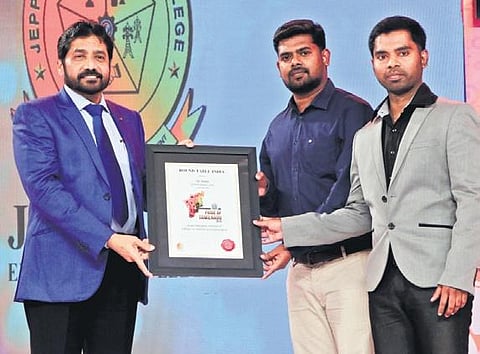

CHENNAI: In a world where globalisation has rendered almost everything just a click away, one might have no difficulty in sourcing the richest of French patisserie and an elaborate sushi spread. But, look past the wonders of such easy access, and you’ll find that it doesn’t apply to a karupatti kadalaimittai or a panam kizhangu halwa. It was precisely this conundrum that P Balathandayuthabani and S Balaji wanted to address when they quit their jobs and launched B&B Organics. Working with farmers from across Tamil Nadu, the duo has made available several varieties of indigenous rice and traditional produce, and the byproducts they have to offer. Four years down, the Tiruchy-based company has a second base in Washington and customers from the US and Scandinavian countries.
First steps
All this started with just trying to source authentic organic food for his brother, says Bala. “Balaji and I are agriculture students; I did my Bachelors in organic farming. We got to meet many farmers in Tamil Nadu and Puducherry. Then, I moved to Sweden to pursue my Masters and PhD. When my brother wanted organic food, I sourced it for him. Later, his friends reached out too. So, we realised that there is a demand for the food but people were not sure about the authenticity of the organic food they were getting. We wanted to break this mistrust,” recounts Bala. Armed with the theoretical knowledge of the business that their education gave them, they decided to take the plunge into the bottomless world of entrepreneurship. After a year of ground research, they set up the store. And that’s where it stopped going as per plan.
They started with different types of indigenous rice but couldn’t sell anything. When bugs began feasting on the stored-away produce, it was Bala’s mother who stepped in and bought it from him. “Lady’s fingers is available in the market for say `20 per kg; if we sell organic lady’s fingers for `40, even the affluent people were not willing to buy. We couldn’t market anything that way,” he narrates. It was then that they decided to build a unique identity for themselves, instead of competing in a market that already had organic brands that were far older than them.
The first step was to reassure the customer that their products were 100 per cent organic. They began sending samples of all the products they had in store for testing and provided the nutritional information for the customer. With that out of the way, they focussed on creating a stand-out inventory — one that featured produce and products that were nearing extinction from disuse. “We collaborated with farmers to bring many indigenous rice varieties to the open market. Initially, the farmers were hesitant. But, we let them fix the price and promised to deliver on it; even then, they were reluctant. When we started buying from them (post-harvest), they began to trust us. Now, we work with over 500 farmers and sell more than 50 rice varities. With this, we began to provide value-added products (flour, rice flakes, dosai batter). Soon, we plan to increase it to 365 kinds of rice,” he details.
Finding a balm for palm
The interest to bring back foods that are fast disappearing from our way of life turned their attention towards the palm tree. It was this search that led them to introduce kadalaimittai made with palm jaggery and palm sugar syrup to their list. Even as the tree’s population is on a steep decline in the state, they are teaming up with palm workers from several districts to bring out more products like panam kizhangu halwa. Karupatti-based sweets, millet cookies, millet/red rice noodles and semiya are in the making too.
The website also provides insights on the best nutritional cures/supplements for ailments and the perfect additions for an average human’s age and gender-based needs. A part of their profits also funds their sparrow conservation project, under which they provide simple birdhouses and tips on how to make them hospitable for the birds. All this in an effort to return to a life that’s one with the ecosystem we live in. Even as start-ups like his are doing their part in bringing the balance back to our skewed lifestyles, we — as the consumer — just step up and take responsibility in our choices, urges Bala. “When it comes to food, people look for cheap stuff. It is important to know where the food is coming from and how it’s made. Now, there’s plenty of awareness for cold-pressed oils. But it’s the people who force the sellers into adulteration. If a litre of cold-pressed gingelly oil is sold for `350, that’s the real price. When we expect that for `100-`200, there’s adulteration. People should learn to spend better on the food they consume, encourage local businesses with their support,” he suggests.
For details, visit: bnborganics.com